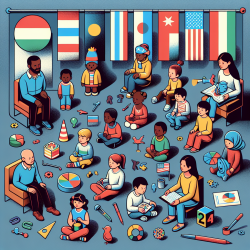Introduction
The ongoing conflict in Ukraine has brought about significant challenges, not only in terms of physical infrastructure but also in the realm of mental health, particularly for children. The study titled "Change in child mental health during the Ukraine war: evidence from a large sample of parents" provides crucial insights into how the war has impacted the mental health of Ukrainian children. As practitioners, understanding these changes and their underlying factors is vital for improving therapeutic interventions and outcomes.
Key Findings from the Research
The study surveyed 1,238 parents and found a marked increase in mental health issues among children since the onset of the war. The data revealed:
- 35% of parents reported increased worries in their children.
- Significant rises in internalizing problems, such as anxiety and depression.
- Notable increases in attention problems and externalizing behaviors.
These findings highlight the profound psychological impact of the war on children, emphasizing the need for targeted mental health interventions.
Understanding Risk Factors
The study identified several sociodemographic and war-related risk factors associated with these mental health changes:
- Exposure to War Trauma: Children exposed to war-related events showed higher internalizing problems.
- Pre-existing Mental Health Issues: Children with prior emotional or behavioral problems were more susceptible to increased symptoms.
- Parental Influence: Parental stress and mental health issues, such as PTSD and depression, correlated with child mental health problems.
These insights are crucial for practitioners aiming to tailor interventions that address these specific risk factors.
Implications for Practitioners
For practitioners working with children affected by war or similar traumatic events, this study underscores the importance of a comprehensive approach that considers both individual and environmental factors. Here are some actionable steps:
- Holistic Assessment: Incorporate assessments that evaluate both child and family mental health to identify at-risk individuals.
- Trauma-Informed Care: Utilize trauma-informed therapeutic techniques to help children process and cope with their experiences.
- Parental Support: Provide resources and support for parents to manage their own mental health, which in turn can benefit their children.
Encouraging Further Research
While this study provides valuable insights, it also highlights the need for further research to explore the long-term effects of war on child mental health and the effectiveness of various intervention strategies. Practitioners are encouraged to engage in or support research efforts that aim to deepen our understanding of these issues.
To read the original research paper, please follow this link: Change in child mental health during the Ukraine war: evidence from a large sample of parents.










